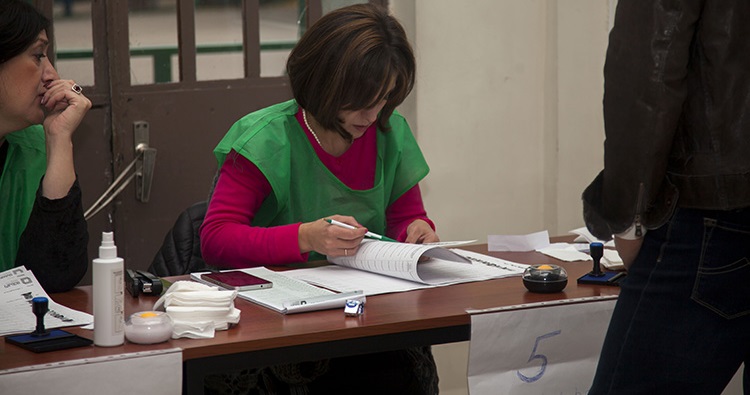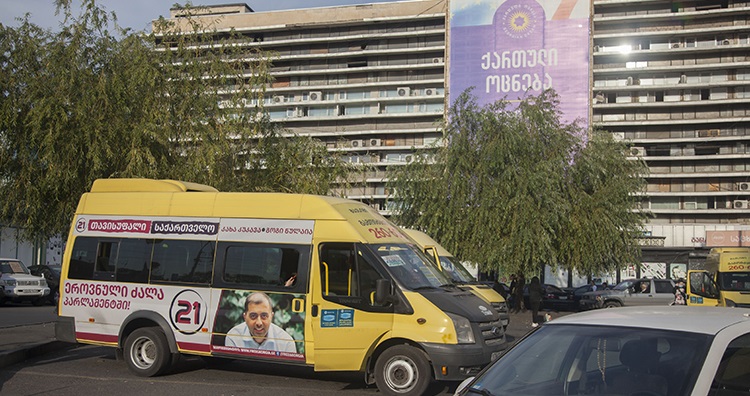NDI releases recommendations to improve information environment, inclusion ahead of Georgia’s parliamentary elections

NDI issued its second pre-election bulletin based on analysis of eight international election experts between August 20 and October 20. Photo: Nino Alavidze/Agenda.ge achieve
The National Democratic Institute (NDI) has released its second pre-election bulletin today with recommendations aimed to improve the information environment and ensure inclusion of marginalized groups ahead of Georgia’s parliamentary elections of October 31.
Georgia’s media environment is among the freest and most diverse in the region, but it is highly polarised, potentially impacting citizens’ ability to make informed electoral choices”, NDI said.
Stressing the importance for citizens ‘to receive regular and reliable information about elections and political developments’ it said ‘recent reports of interference with journalists’ work are troubling’.
NDI referred to incidents including:
- a protest that forced a Pankisi-based radio station to shut down temporarily
- a threat against a journalist’s life in Bolnisi
- violent clashes in Marneuli that left reporters and camera operators injured
 Georgian authorities claim the upcoming parliamentary elections in Georgia will be held with high standards of safety regulations at polling stations amid the coroavirus pandemic. Photo: Nino Alavidze/Agenda.ge
Georgian authorities claim the upcoming parliamentary elections in Georgia will be held with high standards of safety regulations at polling stations amid the coroavirus pandemic. Photo: Nino Alavidze/Agenda.ge
Speaking of election debates, NDI noted that securing ruling Georgian Dream (GD) party participation has been difficult for many national and regional broadcasters.
Although GD participated in the Georgian Public Broadcaster (GPB) debate on October 15, the majority of both national and regional outlets, particularly those viewed as opposition-leaning or critical of the government, report that the ruling party has avoided or ignored their programmes”, NDI reported.
Emphasising the role of social media as ‘an increasingly important source of information’ in Georgia, NDI said this means that ‘exposure to online manipulation is growing’.
While Facebook, the most popular platform in the country, has recently taken down large domestic disinformation networks, other domestic and foreign influence operations remain active”, the report reads.
It meanwhile adds that disinformation regarding COVID-19 ‘remains prevalent’, while the recently resumed fighting in nearby Nagorno-Karabakh ‘has sparked new disinformation narratives’.
In its pre-election bulletin NDI notes as well that ‘despite legal protections, women, ethnic and religious minorities, people with disabilities and LGBTI communities still struggle for political representation’.
 A total of 48 political parties and 2 election blocs are competing for 30 majoritarian and 120 proportional seats in 150-member parliament. Photo: Nino Alavidze/Agenda.ge
A total of 48 political parties and 2 election blocs are competing for 30 majoritarian and 120 proportional seats in 150-member parliament. Photo: Nino Alavidze/Agenda.ge
To improve information environment and ensure inclusion of the above mentioned groups, NDI recommends that:
- The Georgian National Communications Commission, in coordination with the CEC, should take additional steps to publicize rules and proactively ensure compliance among the media and political parties
- To safeguard voters’ access to balanced and reliable information, political parties and candidates should participate in all available debates and political programmes to present their policies and plans to the public
- Media outlets and journalists should be allowed to perform their legitimate functions and exercise their rights, in keeping with journalistic ethics, without interference. Authorities should investigate alleged incidents in a timely manner and ensure that the perpetrators are adequately sanctioned
- To increase transparency and avoid circumvention of the campaign finance rules, the electoral code should include provisions on the declaration of pages or social media used for campaign purposes. In order to increase their capacity to vet online advertising, state authorities should also establish communication with Facebook before elections
- The government, political parties, civil society groups, journalists and online platforms should continue and expand efforts to detect and mitigate disinformation in the elections, and should implement long-term strategies to strengthen information integrity and community resilience
- Political parties should put in place internal mechanisms to ensure women candidates are well supported throughout the remainder of the campaign
- In the remaining days of the campaign, parties should make a deliberate effort to provide concrete details and steps regarding how they would address issues of importance to marginalized populations
- Political parties and candidates should avoid topics that risk increasing division or tensions, including the fighting in Nagorno-Karabakh, and instead focus campaigns on program priorities and speak more directly to the needs of minority communities in Georgia
- Political parties should sign on to the multi-party memorandum against the use of homophobic language in elections
This is NDI’s second bulletin based on analysis of eight international election experts. The first bulletin covering the activities of the election administration and assessing campaign environment was released on October 9.
NDI will monitor the overall election process until its conclusion and will issue a comprehensive assessment shortly after the elections.
 Tweet
Tweet  Share
Share